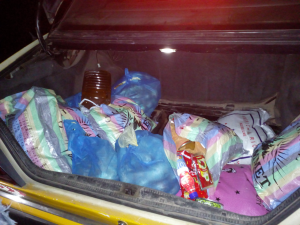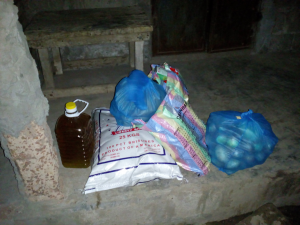 The COVID-19 pandemic caused by the novel Coronavirus is showing that nobody is safe from getting infected. It doesn’t matter if you’re are black or white, if you’re are poor or rich, if you’re are healthy or sick, the virus can catch anyone, anywhere. In about 3 to 4 months, the Coronavirus has spread all over the world, affecting almost every country and region. This virus knows no borders.
The COVID-19 pandemic caused by the novel Coronavirus is showing that nobody is safe from getting infected. It doesn’t matter if you’re are black or white, if you’re are poor or rich, if you’re are healthy or sick, the virus can catch anyone, anywhere. In about 3 to 4 months, the Coronavirus has spread all over the world, affecting almost every country and region. This virus knows no borders.
“As the virus knows no borders, the collective reaction to this pandemic must also be managed without borders. Supplies must be sent to those most in need. Health workers must be protected so they can sustain the response over weeks and months. Sharing of data, knowledge, resources and health personnel can be game-changers in enabling national health services to cope. (…) In the struggle to contain this pandemic, no one should be left behind.” Dr. Christos Christou, Doctors Without Borders / MSF
A global issue needs collective response
It can be observed that countries try to close their borders to stop the spread of the virus, but they forget, that the virus is already everywhere. This virus knows no borders. As humanity is fighting this invisible threat, we can see that even countries with well equipped healthcare systems cannot handle the COVID-19 outbreak. At this time, the epicenters are to be found in the global north, in Europe and the U.S. Even there, the healthcare systems are overburdened. And the virus is far away from running off.
“The Future of the COVID-19 Pandemic: Lessons Learned from Pandemic Influenza” published on April 30, 2020 by CIDRAP, the Center for Infectious Disease Research and Policy, reports that the pandemic will last up to two years:
“The length of the pandemic will likely be 18 to 24 months”.
Experts already warning that this disease will spread in the global south, where many people living under precarious circumstances, often with little or no access to running water and healthcare. This could lead to unbearable problems and a collapse of the weak healthcare systems, which are already running down due to insufficient resources. Whilst the warnings are little-noticed, the virus is spreading quickly around Africa and the global south.
“COVID-19 is a respiratory disease with mild or moderate symptoms for the vast majority of people who catch it, but it causes quite serious complications among those at risk, especially the elderly and people with other medical conditions.” From Ebola to COVID-19: West Africa must learn from the past and protect vulnerable people, MSF, 31 Mar 2020
Strengthen hygiene and infection prevention measures
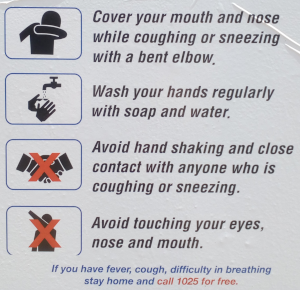 The collapse of healthcare systems will first effect the most vulnerable groups. Newborn, young children, elderly or people who are already struggling with other medical conditions, like hypertension, TB, HIV, cholera, measles or circular malaria outbreaks.
The collapse of healthcare systems will first effect the most vulnerable groups. Newborn, young children, elderly or people who are already struggling with other medical conditions, like hypertension, TB, HIV, cholera, measles or circular malaria outbreaks.
“Most countries have already taken measures to stop the spread of the virus, such as closing aerial borders, banning gatherings and closing schools, without going as far as total confinement for the moment. If they make it possible to slow the spread, these measures will, however, affect the economies of countries and populations that often live from day to day. They will also impact vulnerable people in countries already dealing with humanitarian crises. (…)
Yet, it is imperative to strengthen not only the response to the humanitarian crisis but also hygiene and infection prevention measures, in order to stop the virus spreading in a country where access to water is largely insufficient.” From Ebola to COVID-19: West Africa must learn from the past and protect vulnerable people, MSF, 31 Mar 2020
Learning from the past should lead to an lasting increase of public healthcare systems. People need access to health protection and cure at any time. There is a huge demand for healthcare facilities, and rather a need of basic equipment, necessary drugs and as well health professionals. As the healthcare systems in West African countries are week, they could easily collapse during a heavy COVID-19 outbreak.
Strengthen social protection systems
Beside the impact on the healthcare systems, the measures to stop the spread of the virus will affect everybody’s life. The International Labour Organization ILO is warning: “As job losses escalate, nearly half of (the) global workforce (is) at risk of losing livelihoods.”
Social Protection means, that people have “access to health care and at least a basic level of income security throughout the life course is critical.”
“Lessons learned from previous epidemic outbreaks, such as the SARS, MERS and Ebola outbreaks, demonstrated that the lack of social protection measures in the context of health epidemics aggravates poverty, unemployment and informality, leading to a vicious circle of even greater fragility.” ILO, 23 April 2020, Factsheet: Social protection responses to the COVID-19 crisis
In Africa, where many people are living from day to day, from hand to mouth, and depend on informal economies, the aftermath of the COVID-19 pandemic is able to bring millions of people in serious trouble. It will increase poverty and inequality.
Especially people working in the informal sectors or without any kind of social protection system will be hit harder by losing livelihoods. The informal economy includes barter of goods and services, mutual self-help, odd jobs, direct sale activities, self-employed small enterprises like street vending, sewing, artisanry and small farming. Vulnerable people will be affected more than wealthy people. Stuggling hard for every day’s life make it hard, to follow the safety instructions to prevent infection with COVID-19.
“Governments, together with social partners and other stakeholders, should use the COVID-19 crisis as a wake-up call to strengthen their social protection systems, says the International Labour Organization. An analysis shows that countries that have effective health and social protection systems in place and that provide universal coverage, are better equipped to protect their populations from the threats to their livelihoods posed by COVID-19. However, countries that lack a robust health and social protection system will need to develop policies and interventions in an ad hoc way, which is likely to lead to a limited and delayed response.” ILO Press release, 24 April 2020: The COVID-19 crisis: A wake-up call to strengthen social protection systems
Serious respond: practice preventive measures
 If somebody catches the virus or not, everyone will be affected more or less by the outgrowth of the global pandemic. The people have to take this pandemic seriously. To do so implies first to practice preventive measures. As far as everybody can’t stay at home, sanitation and basic physical distancing (also called “social distancing”) can be practiced by everyone. If do so, we can protect ourselves and others by stopping the spread of the virus.
If somebody catches the virus or not, everyone will be affected more or less by the outgrowth of the global pandemic. The people have to take this pandemic seriously. To do so implies first to practice preventive measures. As far as everybody can’t stay at home, sanitation and basic physical distancing (also called “social distancing”) can be practiced by everyone. If do so, we can protect ourselves and others by stopping the spread of the virus.
“The COVID-19 pandemic is a powerful reminder that, in our interconnected world, a weakness in one nation’s health and social protection system poses a risk to public health everywhere. Global health inequalities must be addressed as a priority. Thus, the crisis has once again called attention to the importance of ensuring universal access to social protection systems that provide comprehensive and adequate benefits that meet people’s needs. (…) This renewed recognition should lead to increased global cooperation for the adoption of universal social protection systems everywhere. Several policy observations and recommendations can be derived from this crisis. ” ILO, 23 April 2020, Factsheet: Social protection responses to the COVID-19 crisis
The Coronavirus is serious, doesn’t matter if it came from humans or nature. We must take it seriously, prevent ourselves, our families and friends for a better future. People have to learn to share globally, then if the health care system is weak in one place, it will hit everybody. Only global solidarity can help us find a way out of this impasse. While keeping physical distance, we have to come together, to help each other — through cash or kind. Already, the whole world is in it together.
Eliminate poverty
Global solidarity have to be sustainable. Global solidarity must go beyond fighting COVID-19. This disease is not the only one killing people. Hunger is all around, in many places of this world, like in West Africa, the health care system is insufficient, the malaria season is soon coming etc.
The COVID-19 crisis will bring more hunger to this world. To combat COVID-19 confident of victory, we have to fight poverty, in fact we have to abolish poverty globally. For a good life for all.
]]>Because of that, we call on people who are able to afford it, to start their own initiative for global solidarity, or to participate in an already existing one. If you know struggling people, you can support them on your own. If you like to provide food for people in need and you have no contacts, we can help you find them.
- You can start collecting donations for food and sanitary items from friends or your family and transfer it together. The costs for one transaction of money to African Countries are about € 50 to 60. For smaller amounts you can use one of the many companies offering money-transfer, but they will eat about 20% of the total amount (including the high costs for the transfer and the worse exchange-rate).
- The food packages we are providing for families costs some € 70. One handwashing-equipment including soap costs around € 8.
- If you like to transfer money for support to The Peoples Collective Food Fundraising Project please contact:
Email: thepeoplescollective@riseup.net
]]>
One beneficiary who was a mother of seven (7) expressed happiness and gratitude. Saying she makes her ends meet by selling in the market but now that she has food on her table, she will be able to stay at home and look after her kids. As it is said, to keep social distance is important to stop the spread of the Coronavirus. But a privilege which many people in The Gambia don’t have because of the high poverty rate and the people are facing more and more hunger during these trying times.
The distribution continues in Sanyang and Kololi where different families who have little or no provisions benefited. Similar distributions took place during the last four days, so we could already supply some twenty families.
Apart from distribution of provisions (food stuffs) different shops and houses also received hand washing equipments geared towards mitigating the spread of the virus.
We call on other people to emulate the gesture, as we cannot supply all the people in need. There are many struggling families in The Gambia and the government isn’t really taking responsibility and supporting them with essentials.
Anybody who like to support us, can contact us:
Email: [email protected]
Phone/Signal/Whatsapp: +220 779 14 17
Putting this into consideration now that the COVID-19 outbreak has struck and people are advised to keep physical distance, which will be difficult knowing the fact that the people in the Gambia are very socialized.
Furthermore to avoid the spreading of the virus people are asked to stay home and many shops have been closed. The majority of the Gambians living from hand to mouth and make ends meet from the streets, markets or shops which are of course always crowded.
Many don’t have the privilege of self isolation or physical distancing (aka social distancing) because they have kids to feed and bills to pay. Because here, like many parts of the world, prevention from the Corona virus is a privilege many cannot afford precisely because the basic necessities of life don’t come by any easy. The people will still join crowded buses, shop in busy markets etc in the midst of hiking prices of commodities.
People cannot stay home without food,they will have go out to find food and if they do, they are at risk of getting infected and transmitting it to their family members and if they also decide to stay home they will die of starvation.
Therefore in as much as we want to advocate for physical distancing; there is a need for us to find a way out on how to help the needy sustain their family members by supporting them with provisions (food and personal-care products).
With food in the house, people will stay home and we can be able to contain the virus. More sensitization is needed as people need to know how deadly the virus, so they can take it seriously, more disinfectants and materials are needed for proper prevention.
If you like to support, please start your own initiative or contact us:
Email: thepeoplescollective@riseup.net
Food for the people
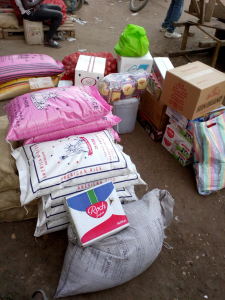
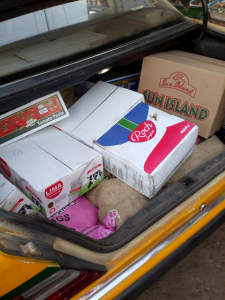
Shopping ….
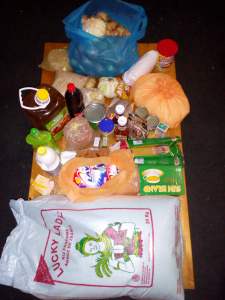
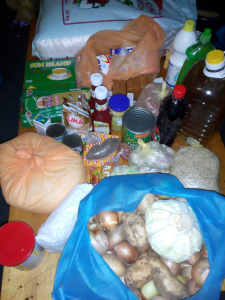
… packing …
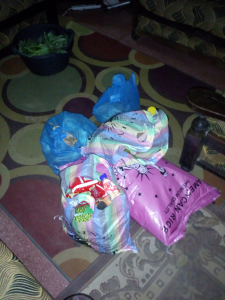
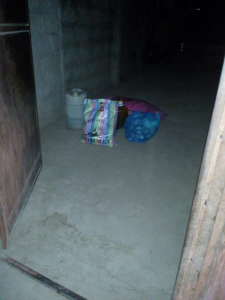
… and supplying
